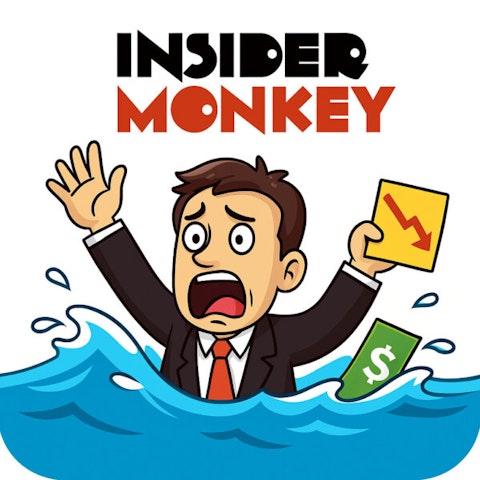A lackluster performance persisted on Wall Street last week, as President Donald Trump’s fresh tariff tirades to various countries dragged down investor sentiment anew.
On a week-on-week basis, the Dow Jones was down by 1.02 percent, the S&P 500 decreased by 0.3 percent, and the tech-heavy Nasdaq dipped by 0.07 percent.
The overall sentiment spilled over to individual stocks, with 10 companies—predominantly related to the technology sector—dragged down heavily.
In this article, we name the 10 worst-performing stocks of last week and detail the reasons behind their drop.
To compile the list, we focused exclusively on stocks with a $2 billion market capitalization and more than 5 million shares in trading volume. The companies were ranked based on the difference in their closing prices on July 3 and 11, 2025.

10. GitLab Inc. (NASDAQ:GTLB)
GitLab saw its share price drop by 9.3 percent week-on-week, as investor sentiment turned cautious following the release of several critical patches to address vulnerabilities.
In a statement posted on its website last week, GitLab said the most critical flaw carries a CVSS (Common Vulnerability Scoring System) score of 8.7, considered highly severe, as it could allow hackers to execute malicious actions on behalf of its users through content injection.
Another one, rated medium, could allow restriction bypass through API manipulation.
Two others with low severity scores were also addressed, which could allow authenticated users to bypass various group-level restrictions through crafted API requests or manipulation of group invitation functionality.
GitLab Inc. (NASDAQ:GTLB) urged all its users to immediately upgrade all self-managed installations to the latest security patches.
In other news, GitLab Inc. (NASDAQ:GTLB) remained a stock “buy” for BofA Securities, giving the company a whopping price target of $72, marking a 71.3-percent upside from its last closing price of $42.03.
BofA Securities said it was optimistic about the company’s duo strategy, which it expected to drive higher adoption of premium paid tiers and add-on AI products such as Duo Pro, Duo Enterprise, and the Agent Platform.
9. Rigetti Computing, Inc. (NASDAQ:RGTI)
Rigetti Computing dropped its share prices by 9.44 percent week-on-week as investor sentiment was dragged down by an investment company’s pessimistic comments about its stock.
In a market note last week, Zacks Research gave Rigetti Computing, Inc. (NASDAQ:RGTI) a “sell” recommendation, taking path from the first quarter’s surprisingly disappointing earnings results and expectations that it will carry over to its next earnings results.
“[Rigetti Computing, Inc. (NASDAQ:RGTI)] reported revenues of $1.47 million in the last reported quarter, representing a year-over-year change of -51.8 percent. EPS of -$0.08 for the same period compares with -$0.14 a year ago. Compared to the Zacks Consensus Estimate of $2.46 million, the reported revenues represent a surprise of -40.16 percent. The EPS surprise was -60 percent,” Zacks Research underscored.
“Over the last four quarters, the company surpassed EPS estimates just once. The company topped consensus revenue estimates times over this period,” it added.
According to Zacks Research, Rigetti Computing, Inc. (NASDAQ:RGTI) is currently trading at a premium to its peers, having returned 21.5 percent over the past month, while the Internet/Software industry, to which it belongs, gained by only 2.7 percent during the period.
8. Datadog, Inc. (NASDAQ:DDOG)
Datadog fell by 11.4 percent week-on-week as investors unloaded portfolios following a brokerage firm’s “sell” recommendation on its stock.
In a market note last week, Guggenheim Securities downgraded Datadog, Inc. (NASDAQ:DDOG) to “sell” from “neutral” over fears that its revenues could erode if its largest customer, OpenAI, moves workloads in-house.
The brokerage firm underscored OpenAI’s ongoing development of its own log management and metric tool, a shift that could dent Datadog, Inc.’s (NASDAQ:DDOG) billings in the second half of the year.
Analysts estimate OpenAI to account for around 60 percent of Datadog’s AI-native customers, and slash as much as $150 million in revenue hole by 2026.
For the fourth quarter of the year, Guggenheim Securities expects Datadog, Inc. (NASDAQ:DDOG) to record a 17-percent growth in revenues, much slower than the 24.6-percent gain in the current quarter.
Additionally, the brokerage firm expects revenues to grow at a slower pace of 15 percent.
7. D-Wave Quantum Inc. (NYSE:QBTS)
D-Wave dropped its share prices by 11.8 percent week-on-week as investors unloaded positions over fears that the aggressive expansion moves of two technology giants into the quantum computing industry could threaten its competitive edge.
This is after the International Business Machines (IBM) recently announced its Starling quantum computer, which it expects to perform 20,000x better than today’s quantum computers and is targeted to be fully operational by 2029.
Meanwhile, Google developed in December last year its state-of-the-art quantum chip called Willow, which could reduce errors exponentially and perform a standard benchmark computation in under five minutes that would take one of today’s fastest supercomputers 10 septillion years.
In contrast, D-Wave Quantum Inc. (NYSE:QBTS) unveiled its Advantage2, which is able to solve problems beyond the capabilities of a classical GPU-based supercomputer through optimization, materials simulation, and artificial intelligence (AI).
According to Forbes contributor Peter Cohan, while D-Wave Quantum Inc.’s (NYSE:QBTS) niche use cases are growing, its ability to scale may fall short as IBM and Google push deeper into enterprise markets.
6. Oscar Health, Inc. (NYSE:OSCR)
Oscar Health declined by 12.7 percent week-on-week as investor sentiment was dampened anew by another rating downgrade for its stock.
Last week, Wells Fargo lowered its stock rating and price target for Oscar Health, Inc. (NYSE:OSCR) to “underweight” from “equal weight” and to $10 from $16 previously, amid concerns about rising medical costs and inadequate pricing for 2025. The new price marked a 30.4-percent downside from its latest closing price of $14.38.
This followed Barclays’ first coverage of Oscar Health, Inc. (NYSE:OSCR) on July 2, assigning the firm with an “underweight” rating but with a price target higher than Wells Fargo’s, of $17 apiece.
According to Barclays, its coverage reflected policy risks that could derail the insurer’s ambitious margin and growth targets.
It can be recalled that Oscar Health, Inc. (NYSE:OSCR), under new leadership, set a goal of more than $2.25 earnings per share by 2027.
5. Mobileye Global Inc. (NASDAQ:MBLY)
Mobileye Global declined by 15.5 percent week-on-week as investors turned sour on Intel Corp.’s disposition of $900 million stake in the company, as the latter embarks on a corporate restructuring initiative to claw back to profitability.
In a statement, Mobileye Global Inc. (NASDAQ:MBLY) said that Intel Corp.’s subsidiary, Intel Overseas Funding Corporation, planned to sell 50 million MBLY Class A common shares at a price of $16.5 apiece for a total of $825 million. It granted its underwriters an option to purchase an additional 7.5 million shares for a total of $123.75 million.
If fully subscribed, the transaction would be worth a total of $948.75 million.
Meanwhile, Mobileye Global Inc. (NASDAQ:MBLY) said that it would buy back more than 6.2 million shares upon the conclusion of the share sale at a price equal to the purchase price to be paid by the underwriters in the offering.
Additionally, Intel expressed its intention to convert 50 million of its MBLY Common B shares to Common A shares, which it said it would hold at this time.
4. Quantum Computing Inc. (NASDAQ:QUBT)
Quantum Computing declined by 17.5 percent week-on-week as investors disposed of positions amid the lack of catalysts to boost buying.
Quantum Computing Inc.’s (NASDAQ:QUBT) performance last week suggested that investors may have already priced in its recent inclusion in two Russell indices, and were already waiting for more leads to spark buying.
Effective on June 30, Quantum Computing Inc. (NASDAQ:QUBT) is now an official component of the Russell 3000 Index and the small-cap Russell 2000 Index, expanding its visibility among institutional investors.
The Russell 3000 Index includes the largest 3,000 US public companies by market capitalization, while the Russell 2000 Index is a subset of the broader Russell 3000 Index limited to small-cap companies. Both indices are reconstituted annually by re-ranking companies based on total market capitalization as of the reconstitution rank date, which was April 30, 2025, this year.
3. CoreWeave, Inc. (NASDAQ:CRWV)
CoreWeave saw its share prices fall by 23.8 percent week-on-week as investor sentiment was dampened by its $9-billion merger plan with Core Scientific, Inc. (NASDAQ:CORZ) and news that it was being investigated by a shareholder law firm over the deal.
Last week, the two companies announced the official signing of a definitive agreement, under which CoreWeave, Inc. (NASDAQ:CRWV) will acquire Core Scientific, Inc. (NASDAQ:CORZ) in an all-stock deal.
Under the terms, shareholders of Core Scientific, Inc. (NASDAQ:CORZ) will receive 0.1235 newly issued shares of CoreWeave, Inc.’s (NASDAQ:CRWV) Class A common stock based on a fixed exchange ratio.
“We will be well-positioned to accelerate the availability of world-class infrastructure for companies innovating with AI while delivering the greatest value for our shareholders, who will be able to participate in the tremendous upside potential of the combined company,” said Core Scientific, Inc. (NASDAQ:CORZ) President and CEO Adam Sullivan.
The proposed merger triggered a probe by former Louisiana attorney general Charles Foti, Jr. and law firm Kahn Swick & Foti, LLC.
“KSF is seeking to determine whether this consideration and the process that led to it are adequate, or whether the consideration undervalues the company,” the law firm said.
2. Ultragenyx Pharmaceutical Inc. (NASDAQ:RARE)
Ultragenyx fell by 26.05 percent week-on-week as investor sentiment was largely dragged down by the Food and Drug Administration’s (FDA) rejection of its biologics license application (BLA) for its UX111 (ABO-102) treatment.
In a regulatory filing, Ultragenyx Pharmaceutical Inc. (NASDAQ:RARE) said that the FDA requested additional information and improvements in relation to certain chemistry, manufacturing, and controls (CMC) aspects.
It noted that the observations were not related to product quality concerns product, adding that many of the issues have already been addressed.
UX111 was developed to treat a common type of Sanfilippo syndrome, a group of genetic conditions that begin in early childhood and causes severe brain damage and early death.
The treatment involves managing symptoms, as there are currently no approved disease-modifying medicines.
Ultragenyx Pharmaceutical Inc. (NASDAQ:RARE) said it plans to resubmit updated clinical data from current patients after resolving the FDA’s concerns. A new review could take another six months upon resubmission of a revised BLA application.
1. Core Scientific, Inc. (NASDAQ:CORZ)
Core Scientific nosedived by 30.5 percent week-on-week as investors unloaded positions following news that it was being acquired by CoreWeave Inc. (NASDAQ:CRWV) for $9 billion.
Last week, CoreWeave (NASDAQ: CRWV) said that it signed a definitive agreement with Core Scientific, Inc. (NASDAQ:CORZ) to acquire the latter for a $9-billion all-stock deal.
Under the terms of the agreement, Core Scientific, Inc. (NASDAQ:CORZ) stockholders will receive 0.1235 newly issued shares of CoreWeave Class A common stock for each share of Core Scientific common stock based on a fixed exchange ratio.
According to the companies, the acquisition will help CoreWeave verticalize its data center footprint to future-proof revenue growth and enhance profitability.
“Through this acquisition, CoreWeave will own approximately 1.3 GW of gross power across Core Scientific’s national data center footprint1 with an incremental 1 GW+ of potential gross power available for expansion,” it said.
While we acknowledge the potential of CORZ to grow, our conviction lies in the belief that some AI stocks hold greater promise for delivering higher returns and have limited downside risk. If you are looking for an AI stock that is more promising than CORZ and that has 100x upside potential, check out our report about this cheapest AI stock.
READ NEXT: 20 Best AI Stocks To Buy Now and 30 Best Stocks to Buy Now According to Billionaires.
Disclosure: None. Insider Monkey focuses on uncovering the best investment ideas of hedge funds and insiders. Please subscribe to our free daily e-newsletter to get the latest investment ideas from hedge funds’ investor letters by entering your email below.





